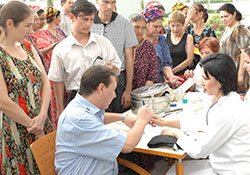Activities

WHO
WHO/Europe supports countries in working for
- Well organized nationally coordinated blood services with appropriate regulatory systems and effective legislation, transposing international safety and quality requirements
- Appropriate blood supplies based on voluntary non remunerated blood donations and their utilization
- Well trained staff to optimize blood service performance and promote patient safety (donor promotion, quality management, patient engagement, optimal transfusion use)
- Reliable reporting mechanisms for adverse/ unexpected events related to substances of human origin (blood, tissues and organs)
The approach draws on strategic directions identified by blood service managers from across the WHO European Region and include priorities recognized during the regular EC meetings of Competent Blood Authorities.
Increased HIV and TB rates linked to social determinants, nosocomial outbreaks of hepatitis B and C, seasonal re-emergence of malaria and West Nile virus in different parts of the Region require continuous assessment of service safety and efficiency.
The new vigilance approach is applied to substances of human origin (including blood, cell, tissues and organs for transplantation), to strengthen epidemiological surveillance, address and prevent system deficiencies identified.
Blood service strengthening supports the implementation of the European action plan for HIV/AIDS 2012-2015, and the European action plan for strengthening public health capacities and services.



